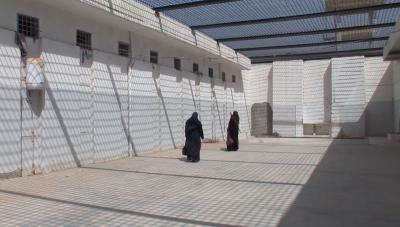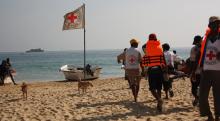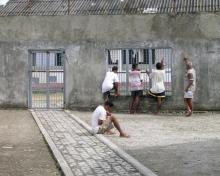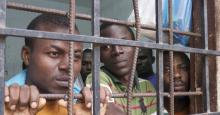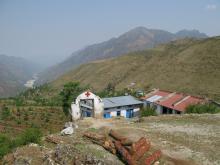Basic international humanitarian law (IHL) rules applicable to this situation:
Enforced disappearance is prohibited.
Whenever possible, each party to the conflict must, without delay, take all possible measures to search for, collect and evacuate the dead without adverse distinction.
The dead must be disposed of in a respectful manner and their graves respected and properly maintained.
To facilitate identification of the dead, each party to the conflict must record all available information prior to disposal and mark the location of the graves.
Each party to the conflict must take all feasible measures to account for persons reported missing and must provide their family members with any information it has on their fate.
The case in brief
Social unrest In Libya steadily escalated in 2011 into armed conflict, leading to thousands of people reported missing. Libya already had a track record of disappearances that had occurred during the Gaddafi regime, which ended the same year.
In 2012, Libya invited the International Commission on Missing Persons (ICMP) to assist in its efforts to build a sustainable process of finding people unaccounted for as result of the 2011 armed conflict, as well as those reported missing in previous years.
Following a cooperation agreement with the Libyan government, the ICMP supported the authorities in the country with a series of measures to improve the search for missing persons.
Donors like the UK and the USA provided financial support to various actors, including the ICMP, to foster national reconciliation and allow families from all sides to find answers.
IHL compliance highlights
As a result of the measures undertaken to implement the cooperation agreement between the Libyan government and ICMP:
- The Libyan authorities initiated the establishment of the Libya Identification Center to facilitate the coordination of the domestic missing persons process and international assistance;
- Fifty Libyan experts from the Libyan Ministry for the Families of Martyrs and the Missing received extensive training in various thematic areas, including personal data processing, forensic archaeology, anthropology, pathology, DNA reference sample collection and post-mortem sampling procedures.
- Over 11,000 genetic reference samples representing over 2,500 missing persons were collected from families of missing persons, enabling authorities to identify 150 persons.
Case prepared by Clara Delarue, Claudia Langianese, Giovanni Medici Tornaquinci, Eleanor Umeyor, LL.M. students at Roma Tre University under the supervision of Giulio Bartolini (IHL Professor), Tommaso Natoli and Alice Riccardi (Research assistants), Roma Tre University IHL Legal Clinic
A. International Commission for Missing Persons AND LIBYAN GOVERNEMENT SIGN AN AGREEMENT ON COOPERATION CONCERNING MISSING PERSONS
[Source: International Commission for Missing Persons (ICMP), November 12, 2012, available at https://www.icmp.int/press-releases/icmp-libya-sign-agreement/ ]
ICMP [International Commission for Missing Persons] Director General Kathryne Bomberger and the Libyan Minister for the Affairs of Families of Martyrs and of Missing Persons, Naser Jibril Hamed, signed an agreement on cooperation in Tripoli today to address missing persons cases from the recent conflicts as well as from the 42-year regime of Muammar Gaddafi.
As part of the agreement, ICMP will provide assistance in the creation of a Libyan Identification Center (LIC) as the first, important step in enabling Libya to develop a sustainable process to work on the issue of missing persons. The LIC will allow for the development of a DNA laboratory system, starting with a facility to collect and store biological samples for DNA identity testing and possibly culminating in the creation of a high throughput DNA laboratory. The LIC would also enable Libyan authorities to coordinate the domestic process, as well as international assistance.
Through the project ICMP will provide comprehensive trainings for Libyan experts involved in the process of investigation of mass graves from field to mortuary and other trainings necessary for a successful recovery and identification process. ICMP will donate a Libya-specific version of its Forensic Data Management System (fDMS), a specialized software solution built internally by the ICMP to record all identification activities. As part of its legal assistance, ICMP will help Libya in creating legislation specific to the missing persons’ process.
“I am delighted to sign this agreement with Mr. Naser Jibril. I have not seen a greater commitment to resolving the cases of missing persons than what I saw here in Libya and ICMP is eager to start working side by side with our Libyan colleagues in resolving this painful part of Libya’s history. Libyan families have the right to know and have the right to justice. ICMP will do all in its power to help Libya create a transparent and accountable process“, said ICMP Director General Kathryne Bomberger during the signing ceremony.
[…]
I am delighted to sign this agreement with Ms. Kathryne Bomberger, the Director General of the International Commission on Missing Persons, ICMP, considering that ICMP is one of world’s most important organizations engaged in the search and identification of missing persons. […] As we sign this agreement we ask the God Almighty to return hope to the families of the missing and we ask Him that we are drawing a path of hope for a better life”, said Libyan Minister for the Affairs of Families of Martyrs and of Missing Persons, Naser Jibril Hamed, following the signing ceremony.
Previously, the Libyan National Transitional Council (NTC) and the Ministry for the Families of Martyrs and Missing (MFMM) invited ICMP to assist Libya in locating, recovering and identifying persons missing from the recent conflicts as well as persons missing from the 42-year regime of Muammar Gaddafi. ICMP has deployed a team of experts to discuss assisting Libya and provide immediate assistance in resolving specific cases. In March 2012 the Libyan Minister for the Affairs of Families of Martyrs and of Missing Persons Naser Jibril Hamed and a group of experts visited ICMP headquarters in Sarajevo.
[…]
B. MISSING PERSONS IN LIBYA
[Source: International Commission of Missing Persons (ICMP), 2021, Libya, available at https://www.icmp.int/where-we-work/middle-east-and-north-africa/libya/]
In 2012, Libya invited ICMP to assist in its efforts to build a sustainable process to find all missing persons, including those missing from the 2011 conflict. ICMP established a program in late 2012 and supported the country in line with an agreement with the Government of Libya.
[…]
ICMP trained Libyan experts, including more than 50 MAFMM staff, in forensic archaeology, anthropology, pathology, DNA reference sample collection and post-mortem sampling procedures. Training on personal data processing, including DNA profiling, matching, and reporting, also was held, with a focus on data protection standards.
As part of work to support legal reforms, ICMP assisted the authorities in developing legal measures to safeguard the rights of families of the missing and initiating the establishment of the Libya Identification Center to support the country’s efforts to coordinate the domestic missing persons process and international assistance efforts.
[…]
With ICMP assistance, over 11,000 genetic reference samples representing over 2,500 missing persons were collected from families of the missing. This enabled authorities to identify 150 persons, including Dr. Mansour Rashid Kikhia, a former Libyan Foreign Minister and Ambassador to the United Nations who later opposed the Gaddafi regime and disappeared in Egypt in 1993. His remains were found in Libya.
In 2014, due to the security situation, ICMP continued to provide support to Libyan stakeholders remotely.
[…]
C. UK PLEDGES $650,000 TO IDENTIFY MISSING PERSONS
[Source: The Free Generation Movement, “Libya Herald: UK Pledges $650,000 to Identify Missing Persons”, February 5 2013, available at https://libyaherald.com/2013/02/uk-pledges-650000-to-identify-missing-persons/]
The UK has pledged $650,000 to the International Commission on Missing Persons (ICMP) to help Libya find and name those who disappeared […].
The funding followed through on a commitment UK Prime Minister David Cameron made during his visit to Tripoli last week, according to ICMP.
“Cameron met Mervat Mhani of the Free Generation Movement (FGM), a Libyan NGO that deals with missing persons issues through their Mafqood (The Missing) project,” said the ICMP. “He pledged UK support to assist and strengthen the Libyan government’s efforts to resolve the issue of persons missing from the recent conflict.”
It said that the money will be spent on analysing DNA samples from the Bin Jawad mass grave, recently supplied to ICMP by the Libyan authorities.
The British Ambassador to Libya, Michael Aron, said that the UK understood the importance of resolving cases of missing persons. “We are proud to support the work that the ICMP is doing to help the Libyan authorities,” he added.
In November last year Libya signed an agreement with the ICMP to work together on identifying human remains. There are thought to be some 10,000 missing persons in Libya, including those who disappeared during Qaddafi’s 42-year rule, as well as people from the revolution.
As part of the agreement, ICMP will help Libya set up a Libyan Identification Centre (LIC), which will include a DNA laboratory system, where samples can be collected and stored for analysis.
[…]
Mhani said that the Libyan government was making huge efforts to deal with missing persons and added: “The direct support of the United Kingdom to resolving the issue of missing persons in Libya comes as a huge incentive to our work.”
D. MISSING PERSONS CENTER BRINGS SEARCHERS TOGETHER
[Source: United States Agency for International Development (USAID), “Families of Libya's Missing Get Help to Find Answers”, September 26, 2013, available at: Link not available.]
When Mohammed Magarief, president of Libya's General National Congress, attended the opening of the Mafqood Center for Missing Persons on Dec. 17, 2012, he provided a DNA sample to help in the search for his brother, Azzat, who has been missing since the 1990s.
His is by no means a unique case. Thousands of families are still searching for answers, with “up to 10,000 people missing … from Libya’s recent conflict” and decades of oppression, as explained in the November 2012 issue of The Economist.
In order to bring healing and reconciliation to affected families, USAID’s Office of Transition Initiatives and the State Department’s Bureau of Democracy, Human Rights and Labor are equipping Libyans with the tools they need to find answers. Such circumstances allow Libyans to come together around a common cause and work towards reconciliation around tangible results and collaborative efforts.
The 2011 civil war has drawn this issue into focus since it's a significant roadblock on the path to a successful transition. During the uprising, persons from both sides went missing, often killed or arrested, and are survived by families who know little to nothing about their whereabouts. Many families are frustrated with the government’s lack of progress in resolving their cases, and while some have registered their missing with the Ministry of Martyrs and Missing, many remain in the dark.
On Oct. 21, 2012, USAID provided a grant to the Mafqood Center to equip and establish a computer room where families from all sides of the conflict will receive training on advocacy using social networking and online media. The Center aims to create not only a sanctuary for families to seek solace and comfort, but also a platform from which the families can form a unified voice to tackle the legal and social issues they face.
“It is more than just an IT center. It is a place where families who fought on opposite sides of the war have learned to sit in the same room and sometimes listen to each other’s stories," said Mervat Mhani, manager of the Mafqood Center project.
Meanwhile, the State Department is providing assistance to the International Commission on Missing Persons to locate, recover and identify missing persons. This project employs advanced forensic techniques, partnerships with Libyan civil society, and an online registry to help authorities identify missing persons and notify families looking for closure.
These complementary efforts foster national reconciliation by allowing families from all sides to find answers and, ultimately, to heal. At the Dec. 17 event, two women were present whose relatives fought on opposite sides during the war. Thanks to the common tools provided, the women went from being unable to speak to each other to learning to empathize with one another’s struggle and, eventually, to finding common ground.
E. Libya opens first DNA lab to trace unidentified bodies in mass graves
[Source: Xinhuanet, “Libya opens first DNA lab to trace unidentified bodies in graves”, 8th March 2018, available at http://www.xinhuanet.com/english/2018-03/08/c_137024048.htm]
TRIPOLI, March 8 [2018] (Xinhua) -- Libya's first DNA analysis laboratory has been opened here to help identify bodies recovered from mass graves.
The laboratory, opened Tuesday and run by the General Authority for the Care of the Families of Martyrs and Missing Persons (GACFMMP), is sponsored by oil company Repsol and the state-owned National Oil Corporation (NOC).
"The laboratory will contribute to ending the suffering of thousands of families of martyrs and missing people all over Libya," the NOC said in a statement.
Khaled Bokhotwa, the NOC's officer of health, safety, environment, security and sustainable development, said the laboratory will ensure "the links between the martyrs and missing persons with their families" through the advanced technology of DNA tracing.
"The laboratory will help identify their families in these difficult times, especially with many bodies extracted from mass graves that have not been identified so far," Bokhotwa said during the opening ceremony.
Mahmoud Al-Herri, head of the GACFMMP, said the laboratory will be used on all mass graves in Libya.
The Libyan Ministry for Martyrs and Missing Persons announced in June 2013 that there had been 2,516 people missing since the 2011 uprising, which toppled former leader Muammar Gaddafi.
The ministry announced that 110 mass graves have been reported in the country so far, and more than 5,000 people were killed during the 2011 uprising.
Discussion
I. Classification of the Situation and Applicable Law
1. How would you classify the situation in Libya in 2011? In subsequent years? What further information would you need in order to make such a determination? (GC I-IV, Art. 3)
II. Missing Persons and Treatment of the Dead
III. Elements Contributing to Respect for IHL

